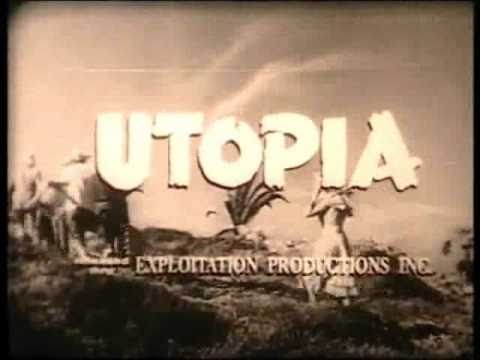|
LITR 5439 |
Literary & Historical Utopias: Model Assignments
Sample Essay 1 |
|
James Seth
A3: Teaching Utopian Literature at the College Level
As a college writing instructor, I feel that utopian literature offers a
useful discourse in higher education. Though many of my students are
non-traditional adult students, I also teach a number of recent high school
graduates who have been exposed—or perhaps overexposed—to dystopian fiction. For
many, the utopian genre seems adolescent or perhaps “cut and dry,” as noted by
student Mallory Rogers. Utopian worlds in J.M. Barrie’s
Peter Pan and L Frank Baum’s
The Wonderful Wizard of Oz conjure up
images of infantile fantasy and wonder. By the time many students enter high
school, the fantasy has died, giving way to dystopian interests. While critics
of utopian fiction claim it is too simple, childish, or idealized, I would argue
that utopian literature can be intellectually stimulating. This essay will first
address the popularity of dystopian fiction in public schools and then present
useful ways of integrating utopian fiction into early college-level courses.
THE DYSTOPIAN DRAW IN PUBLIC SCHOOLS
If one were to ask me why dystopian fiction is frequently used in American
curriculum (Objective 5c), I would say that the dominant themes in dystopian
literature connect to many of the pressures and expectations of junior high and
high school students, in the very broadest sense. Dystopian literature, such as
Ayn Rand’s Anthem, emphasizes themes
of heroic individualism (Objective
1a) and self-reliance. Rand’s protagonist Prometheus is known originally as
Equality 7-2521, attesting to the way that his government creates his identity
at birth. The theme of heroic
individualism is perhaps more appreciated in a place where
success and failure is highly quantified;
for example, high schools often give out class ranks, and grades are recorded as
numbers rather than letters. This quantification also occurs in standardized
testing, which serves as, for better or worse, the hallmark of the American
public school system. However, the emphasis on calculated scores virtually
disappears in college. The course that I teach, for instance, does not even use
the traditional letter grading system because it is a developmental course in
writing, and several of my college professors have stated that the final grade
is not mathematically calculated, but assessed by students’ overall efforts or
their level of improvement in the course.
The high school English curriculum often includes texts such as George Orwell’s
1984 and Aldous Huxley’s
Brave New World to stress the value of
independent thought in a totalitarian
regime, which is important for high school students who have not yet found
their individual voice, or discovered their individual talents, skills,
preferences, and beliefs. In the selection from the Lois Lowry novel
The Giver, Jonas is given the job of
Receiver, and is “selected, as others before him had, to bear their burden.”
Rather than wanting to be fulfill his predetermined role, he “wanted his
childhood again, his scraped knees and ball games” (121). Jonas is struck by
individual celebrations, such as birthday parties, where a child “understood the
joy of being an individual, special and unique and proud” (121). The popularity
of the dystopian novel in the public school system is often qualified by the way
that it relates to their lives, perhaps to the angst of maturation, and perhaps
also to the pressure to conform. In her research post on dystopian teen fiction,
Jenna claims that “The young reader of today demands a story in which the
characters and incidents are relevant to their own world while simultaneously
drudging through issues that were previously off limits.” Though Prometheus in
Anthem is completely restricted from
scientific knowledge, he finds a way to satisfy this curiosity and manifests it
into something useful. For teens, finding a way to connect the “off limits”
topics in literature with their own lives can be challenging. Nonetheless, I
think that it is ultimately purposeful in getting them to better understand
topics such as sex, violence, totalitarianism, intellectual restriction,
conformity, and others in a fictional scenario.
BALANCING EDUCATION AND ENTERTAINMENT
In regards to Objective 1e, Utopian fiction shares the challenging task of
literature, which is to entertain and educate. One of the draws of dystopian
literature is its exciting plots and well-developed characters, making it a more
pleasurable genre in terms of reading consumption. Learning how to balance
pleasure and ideas is not only a task for the utopian writer, but also for the
college instructor, and virtually any teacher. According to student Kathleen
Breaux, “we must keep in mind that education, like perfection, is not a
destination, but a journey.” How to make that “journey” both exciting and
informative can often pose a challenge. For in-class discussion and paper
topics, I give my class short articles relating to a social problem that gets my
students to think, talk, and engage. These texts are not classified as a
literature of pleasure, but a motivating
literature of ideas, and I choose topics that will
initiate conversation and
spark debates. However, in fully
constructed worlds such as Thomas More’s
Utopia and Ernest Callenbach’s
Ecotopia, there is a sense of unity and functionality when the protagonist
enters the community. This relates to my point in my midterm that “One of the
detractions of the Utopian narrative is the absence of conflict (Objective 2b).”
Finding ways to talk about social issues,
rather than plot developments, is something that occurs not only in the utopian
course, but in a number of college courses.
The college classroom is often designed to challenge high school curriculum,
specifically by dismantling firmly-held beliefs about education, introducing
students to different classroom dynamics, and exposing students to social,
political, and cultural knowledge that is not deeply explored in the public
school system. In addition, when students reach the college level, many of their
courses and extracurricular activities will, at least on the outset, emphasize
collectivity and social improvement rather than individual success. I think that
reading utopian literature compliments many aspects of the college experience
and can be effectively paired with a seminar-style class design and an emphasis
on group discussion, rather than
traditional lecturing.
THE SEMINAR AS MODEL UTOPIA
In the college composition course, especially an honors course, students are
expected to evaluate literature and ideas as a
conversation, rather than a
soliloquy. The word discourse is
often introduced to describe how the texts speak to each other, react to one
another, and create new dialogues and discourses. For high school students, the
heroic individualist plot is fairly simple to latch onto and apply to their own
lives, where they are pressured to stand
out from the crowd, whether by clothing, fads, grades, hair and makeup, or
test scores. However, as high school students enter a larger space, the college
campus, they are forced to assimilate into a crowd while simultaneously finding
their own unique place within it. Therefore, it may become necessary to
introduce literature that speaks to this experience, of creating paradise from
dystopia and joining all of the voices together, of enjoying life amidst a large
group of peers and discovering truth through collective engagement.
Addressing Objective 5a, the seminar classroom functions as a utopia in many
respects, and since seminars are prominently used in colleges and universities,
it seems fitting that utopian literature be taught at this level with a
colloquia. The roundtable discussion between classmates will encourage mutual
respect with each other and will eliminate a totalitarian set-up, where the
instructor is positioned as the supreme ruler of the class. In terms of
discussing topics and issues within the literature, works such as
Ecotopia and
Herland address adult issues, such as
sex and politics, which incoming college students can discuss more intelligently
and professionally than high school students. Adult utopian fiction offers a
range of social, cultural, and political topics that can be discussed without a
major conflict or a predictable plot sequence. For example, the ecological
developments in Ecotopia, such as their use of biodegradable plastics and
alternative energy sources, can start conversations on energy, the environment,
corporate responsibility, and bioethics.
In terms of classroom structure, the seminar style often creates the most
peaceful and respectful group of students, largely because all students are
facing one another and can talk directly to one another. In traditional
lecture-style courses, feelings of competition can arise, since the conversation
is largely directed to the instructor, rather than to other classmates. Rather
than discussing issues as a team, students often vie for the attention of the
professor. In my experience, seminar style classes are also generally smaller
than most lecture courses, and students establish greater relationships with
their peers. In many cases, students bring food, reveal information about their
personal lives, and, generally, are less insecure about voicing their opinions
on issues. While many students claim that utopias “don’t work,” they may still
be possible in classroom instruction, where everyone has equal say, equal work,
and can still express their individual beliefs.
Works Cited
Callenbach, Ernest. Ecotopia. New
York: Bantam, 1975.
Gilman, Charlotte Perkins. Herland. New York: Pantheon, 1979.
Lowry, Lois. The Giver. New York:
Dell Laurel Leaf, 1993.
Rand, Ayn. Anthem. New York: Signet,
1961.


